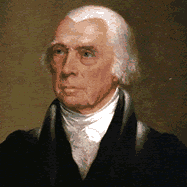James Madison

Madison, James (1751-1836) Statesman, 4th President of the US: Madison grew up in Virginia, studied at the College of New Jersey, now Princeton, and returned to Virginia without a clear career path. In 1774, dismayed by the persecution of Protestant dissenters in his home county, he sought public office in order to bring an end to religious persecution. Although he was a slave owner, he expressed distaste for his position, but could not find an opportunity to fight slavery. His frail body prevented him from joining the military when the colonies broke with England, but Madison fought politically by becoming a representative to the Virginia Convention, which voted to cut ties with Britain and create one of the first state constitutions and bills of rights. Madison's suggestion of changing the wording from "toleration" of religion to "free exercise" of worship made a tremendous impact on the eventual attitude toward religion that would be espoused by the federal constitution. Madison was placed on the state executive council, where he met and befriended Thomas Jefferson. As a member of the Continental Congress, Madison was an important figure in forming western policy, and he became aware of the financial deficiencies of the Articles of Confederation. Upon his return to the state legislature, he began pushing for a convention to revise or redo the Articles, giving more power to the federal government. At the national meeting in Philadelphia in 1787, he met General Washington and Alexander Hamilton, and helped draft the plan which provided the basic blueprints for the federal Constitution. Many of Madison's proposals, including a bicameral legislature, separation of powers, and a responsible revenue system, were accepted by the delegates. Madison then applied his abilities to getting the proposed constitution ratified. He and Hamilton wrote letters under the name "Publius," later published under the title The Federalist, and coordinated efforts to ratify the constitution in several important states. Madison debated with Patrick Henry, and conceded that a Bill of Rights ought to be included in the constitution. When he was elected to the first Congress, he became the major writer of the ten amendments, and supported them through their ratification and adoption as part of the constitution. After 1797, with the end of his term in Congress and a break with Hamilton over issues including fiscal policy, Madison decided to retire. However, Jefferson's presidency in 1801 and his appointment of Madison as Secretary of State brought him out of retirement. Madison served during a crucial period in the young nations history, and helped negotiate through diplomatic and military conflicts with Britain and France. Madison became president in 1809, leading the nation through the War of 1812. He promoted the idea of a national bank, internal improvements funded by the federal government, and an enhanced military force, although these policies were not in line with the original Republican platform. After finally retiring from public life in 1817, Madison spoke out against the sentiments of slavery advocates which were at odd with the unity of the nation. Before he died, Madison prepared his notes from the 1787 Convention for publication.
 >
>